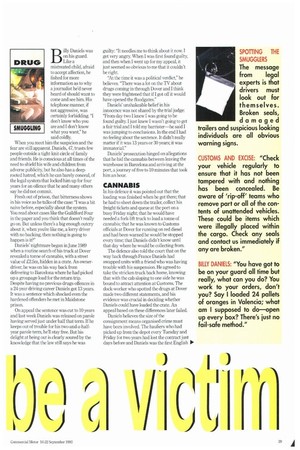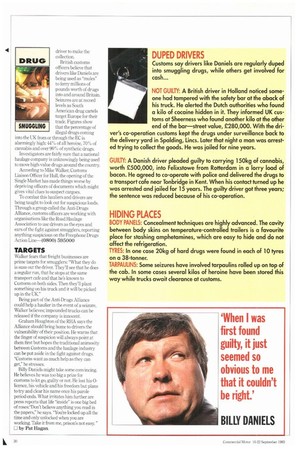B illy Daniels was on his guard. Like a
Page 31

Page 32

If you've noticed an error in this article please click here to report it so we can fix it.
DRUG
mistreated child, afraid to accept affection, he fished for more information as to why a journalist he'd never heard of should want to come and see him. His telephone manner, if not aggressive, was certainly forbidding. "I don't know who you are and I don't know what you want," he said coldly.
When you meet him the suspicion and the fear are still apparent. Daniels, 47, trusts few people outside a tight-knit circle of family and friends. He is conscious at all times of the need to shield his wife and children from adverse publicity, but he also has a deeprooted hatred, which he can barely conceal, of the legal system that locked him up for four years for an offence that he and many others say he did not commit, Fresh out of prison, that bitterness shows in his voice as he talks of the case: "I was a bit naive before, especially about the system. You read about cases like the Guildford Four in the paper and you think that doesn't really go on. But unless there's a big enough outcry about it, when you're like me, a lorry driver with no backing, then nothing is going to happen is it?"
Daniels' nightmare began in June 1989 when a routine search of his truck at Dover revealed a tonne of cannabis, with a street value of £2.5m, hidden in a crate. An ownerdriver, he was on his way back from delivering to Barcelona where he had picked up a groupage load for the return trip. Despite having no previous drugs offences in a 24-year driving career Daniels got 13 years. It was a sentence which shocked even the hardened offenders he met in Maidstone prison.
On appeal the sentence was cut to 10 years and last week Daniels was released on parole having served just under half that term. if he keeps out of trouble for his two-and-a-halfyear parole term, he'll stay free. But his delight at being out is clearly soured by the knowledge that the law still says he was
guilty: "It needles me to think about it now. I get very angry. When I was first found guilty, and then when I went up for ray appeal, it just seemed so obvious to me that it couldn't be right.
"At the time it was a political verdict," he believes. "There was a lot on the TV about drugs coming in through Dover and I think they were frightened that if I got off it would have opened the floodgates."
Daniels' unshakeable belief in his innocence was not shared by the trial judge: "From day two I knew I was going to be found guilty. I just knew I wasn't going to get a fair trial and I told my barrister—he said I was jumping to conclusions. In the end I had no feeling about the sentence. lt didn't really matter if it was 13 years or 30 years; it was immaterial."
Daniels' prosecution hinged on allegations that he hid the cannabis between leaving the warehouse in Barcelona and arriving at the port, a journey of five to 10 minutes that took him an hour.
In his defence it was pointed out that the loading was finished when he got there; that he had to sheet down the trailer, collect his freight tickets and queue at the port on a busy Friday night; that he would have needed a fork-lift truck to load a tonne of cannabis; that he was known to Customs officials at Dover for running on red diesel and had been warned he would be stopped every time; that Daniels didn't know until that day where he would be collecting from.
The defence also told the court that on the way back through France Daniels had swapped units with a friend who was having trouble with his suspension. He agreed to take the stricken truck back home, knowing that with the cab sloping to one side he was bound to attract attention at Customs. The dock-worker who spotted the drugs at Dover made two different statements, and his evidence was crucial in deciding whether Daniels could have loaded the crate. An appeal based on these differences later failed.
Daniels believes the size of the
consignment means organised crime must have been involved. The hauliers who had picked up from the depot every Tuesday and Friday for two years had lost the contract just days before and Daniels was the first English 10.
DRUG
SMUGGLING
British customs officers believe that drivers like Daniels are being used as "mules" to ferry millions of pounds worth of drugs into and around Britain. Seizures are at record levels as South American drug cartels target Europe for their trade. Figures show that the percentage of illegal drugs coming into the UK from or through the EC is alarmingly high: 44% of all heroine, 70% of cannabis and over 90% of synthetic drugs.
Investigators are fairly sure that a national haulage company is unknowingly being used to move high-value drugs around the country.
According to Mike Walker, Customs Liaison Officer for Hull, the opening of the Single Market has made things worse by depriving officers of documents which might gives vital clues to suspect cargoes.
To combat this hauliers and drivers are being taught to look out for suspicious loads. Through a group called the Anti-Drugs Alliance, customs officers are working with organisations like the Road Haulage Association to use drivers as the eyes and ears of the fight against smugglers, reporting anything suspicious on the Freephone Drugs Action Line—(0800) 595000 Walker fears that freight businesses are prime targets for smugglers: "What they do is suss out the driver. They'll see that he does a regular run, that he stops at the same transport cafe and that he's known to Customs on both sides. Then they'll plant something on his truck and it will be picked up in the UK."
Being part of the Anti-Drugs Alliance could help a haulier in the event of a seizure, Walker believes; impounded trucks can be released if the company is innocent.
Graham Houghton of the RHA says the Alliance should bring home to drivers the vulnerability of their position. He warns that the finger of suspicion will always point at them first but hopes the traditional animosity between Customs and the haulage industry can be put aside in the fight against drugs. "Customs want as much help as they can get," he stresses.
Billy Daniels might take some convincing. He believes he was too big a prize for customs to let go, guilty or not. He lost his 0licence, his vehicle and his freedom but plans to try and clear his name once his parole period ends. What irritates him further are press reports that life "inside" is one big bed of roses:"Don't believe anything you read in the papers," he says. "You're locked up all the time and only unlocked when you are working. Take it from me, prison's not easy. " D by Pat Hagan.


























































































